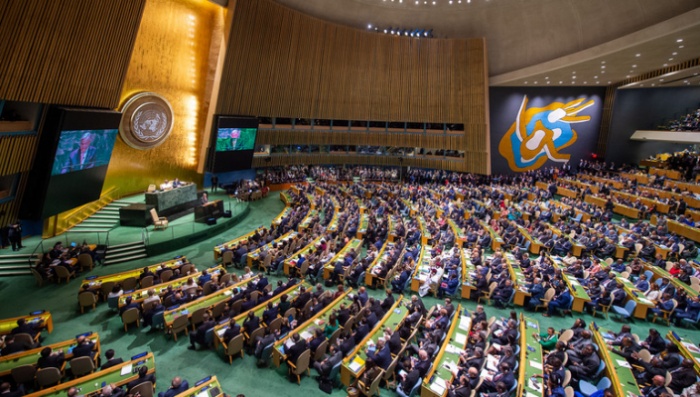Turkey was the only member to vote against two resolutions adopted by the UN General Assembly on the oceans and seas linked to the landmark 1982 United Nations Convention on the Law of the Sea (UNCLOS), Cyprus’s Financial Mirror news website reported.
The UN General Assembly adopted two resolutions on the oceans and seas linked to the landmark 1982 United Nations Convention on the Law of the Sea (UNCLOS), Turkey was the only member to vote against.
The “Oceans and the law of the sea” resolution — adopted by a recorded vote of 135 in favor to one against (Turkey), with three abstentions (Colombia, El Salvador, Venezuela) — called on states that have not done so to become parties to the Agreement for the Implementation of the UN Convention.
It called on countries to harmonize national legislation with the convention and for capacity-building initiatives to consider the needs of developing nations. It urged all states to combat piracy and armed robbery at sea and ensure freedom and safety of navigation.
Cyprus Permanent Representative to the UN Andreas Mavroyiannis said in a statement: “We regret that a vote was requested once again, in a futile attempt to question the UNCLOS as the Constitution of the Oceans and the indisputable legal framework for all activities in the oceans and seas.
“My delegation would like to stress once more that the convention represents a carefully crafted balance among the rights and interests of all states in spite of their specific characteristics.”
In reference to Turkey, he said no state can continue requesting special treatment or denying the rights of other states, such as island states or states comprising islands.
Turkey does not recognize the maritime boundaries of Cyprus and faces EU sanctions for deploying two drillships inside Cypriot waters.
Mavroyiannis also criticized a Turkey-Libya deal to delimitate their maritime borders.
“No country can pursue outlandish maritime claims guided by might, and not by well-established rules of international law, and no state should enter into dubious bilateral arrangements that contravene the convention,” said Mavroyiannis.
“Such arrangements have no legal effect, nor do they affect the status of the UNCLOS as the sole pertinent universal legal framework on the delimitation of maritime zones codifying international law. Upholding the integrity of the convention is the collective responsibility of all of us,” he added.
The representative of Greece also expressed regret that a vote was requested again in an attempt to challenge the convention’s preeminent role and universal character.
“By establishing the legal framework within which all ocean and sea activities must be carried out, the convention promotes legal stability and helps to maintain global peace and security.”



